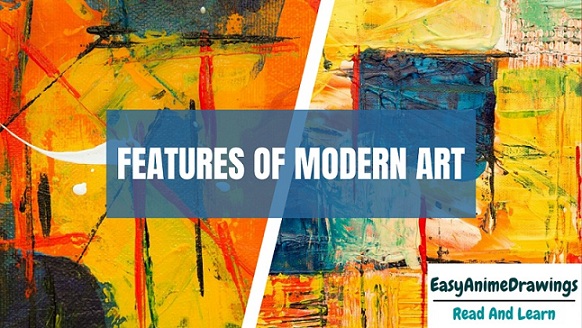Contents
Features of Modern Art: Analysis
The rawness and pure nature of modern art have forced millions of people to pursue this style in a short time. What traditional art has been accomplished for thousands of years, what modern art achieved in a century, Contemporary art can conquer in just a few decades. But how?

Few art experts strongly argue that ‘Modernism is what we can end up calling the art of our world.’ Hmm… The art of our world!
Hearing this proposal, I could not restrain myself from closing the connection between art and the world. The meaning of modern art and its manifestations cry out for something more critical and less attractive than art. And this kind of creation is being produced in our age, that’s it.
So, from a broader perspective, Contemporary art is the latest extension of the long line of art that goes back to prehistoric times. In short, modern art is another chapter of an art book.
One of the most enlightening ways to describe Contemporary art is art expression to show that the world is too complex to understand and integrate. If you try to fit in with one person or another group and your thoughts and attitudes, the situation may seem bleak. Do you not feel the same way when you see a modern-day piece?
Today’s activities are complex, confusing, but pleasing to the eye because they can convey that clear sense of human understanding that shows that our world is connected to many threads with a dynamic diversity of cultures, nations, and peoples.
Contemporary Art and its History
Having clarified the meaning and features of modern art, we now turn our attention to the timing of this style of meeting. Modern art is fragments or works produced by artists from the 1970s to the present.
Now everything may seem simple, but it is doubtful that the works of art at that time were produced before the second half of the 20th century.
Modern art arrangements go back to the beginning of Modernism in lands where English was the country’s dominant language. A prominent artist named Rogic Fry founded the Contemporary Art Society in London in 1910. Adding to the list was the establishment of the Contemporary Art Society of Adelaide, Australia, in 1938.
In fact, after the end of World War II, the number of artistic institutions of the day increased dramatically. How, then, did modern art creep into the modern era of modernism?
Before it, modernism and the movement gradually unveiled the red carpet so that modern art could enter and become the kind of evolution that the world could accept. Even the arts organizations that emerged after WWII laid a solid foundation for the modern form of building its castle.
Let us take a quick look at another 20th-century movement that paved the way for a powerful arena of contemporary art.
It opens the history of modern art with examples.
Modernism was at its peak in the mid-20th century. World War II was over, and globalization changed for the better. New York has replaced Paris as the world capital of art, and the USA has become a significant new force.
This was a time of change when artists dared to try and find ways to express themselves, and artistic freedom was at an all-time high.
Pop Art
This was the first of many movements that began to transform the idea of creating a modern style into a vague, liberal creation. Pop art marked its arrival in the 1950s and became popular until the 1970s. The leading artists of this period were Andy Warhol, Roy Lichtenstein, etc., who were determined to represent the great culture through their creations.
Take, for example, this Warhol masterpiece, in which he subtly depicts Marilyn Monroe’s various shadows by representing 4 tablets each of the 40 inches mentioned.
Pop Art – Examples of Modern Art
If you think the Pop art tour ended in the 1970s, it never happened. Artist Jeff Koons reclaimed the form by renovating it and naming it Neo-Pop Art in the 1980s.
His work has been instrumental in setting the stage for future artists to develop something new and exciting. Below is his beautiful work ‘Balloon Dog (blue),’ which surprised several art lovers worldwide.
Pop Art – Examples of Modern Art
Pop art was about reproducing things artistically and aesthetically. Encouraged by this, another organization called Photorealism came to the market. These artists wanted to develop surrealistic paintings and drawings. The source of this creation is visual images, where artists begin to create detailed world conditions, lengths, and associated images.
Chuck Close, a well-known artist of Photorealism, did not hesitate to bring down the captivating and intriguing images of the audience. His ‘Fanny / Fingerpainting,’ developed in 1985, showcases his art and creativity (Yes, he created this heart-wrenching image using only his fingers).
Conceptualism
Art was regarded as a commodity for thousands of years, an idea firmly rejected by modern artists. Pop art, as mentioned, was a straightforward brick maker who supported the whole movement to open up a consistent path of modern art to strengthen its existence further. This happened with conceptualism again, an art style formed by Pop art.
Launched as a formal art movement, conceptualism is still practiced as one of the modern forms of art. Conceptual art is about the thought process that makes the thought process of art creation take over.
Artists such as Jenny Holzer, Damien Hirst, and Ai Wei Wei have reinforced this artistic movement by producing some of the unique creative creations of our time.
Check out this confusing (by definition) and simple creation of Ai Wei Wei that has shaken the entire art world with appeal and deep-rooted understanding.
Minimalism
What is the meaning of modern art? The whole world is busy praising and enjoying the fascinating expression of this artistic style. Still, the artists of the 1960s were already clear about the attention to the artistic meaning of the time. This, too, is one of the modern forms of modern art that can be seen in the marketplace. The essence of small-scale creation lies in the challenges these pieces offer so that they do not develop, fragmentation, and artistic expression. Minimalism gives viewers the power to respond to artwork as their understanding and knowledge and reject all common representations.
The following work of the famous minimalist, Sol LeWitt, showcases the joy and uniqueness of these art pieces.
Examples of Modern Art
These are excellent examples of modern art, many of which are still widespread and processed in the global market. Modern art and its history, thus expanding from a century ago when artists have continued to work to free themselves from the perception of reality and any thought process that obliges them to create within the limit.

